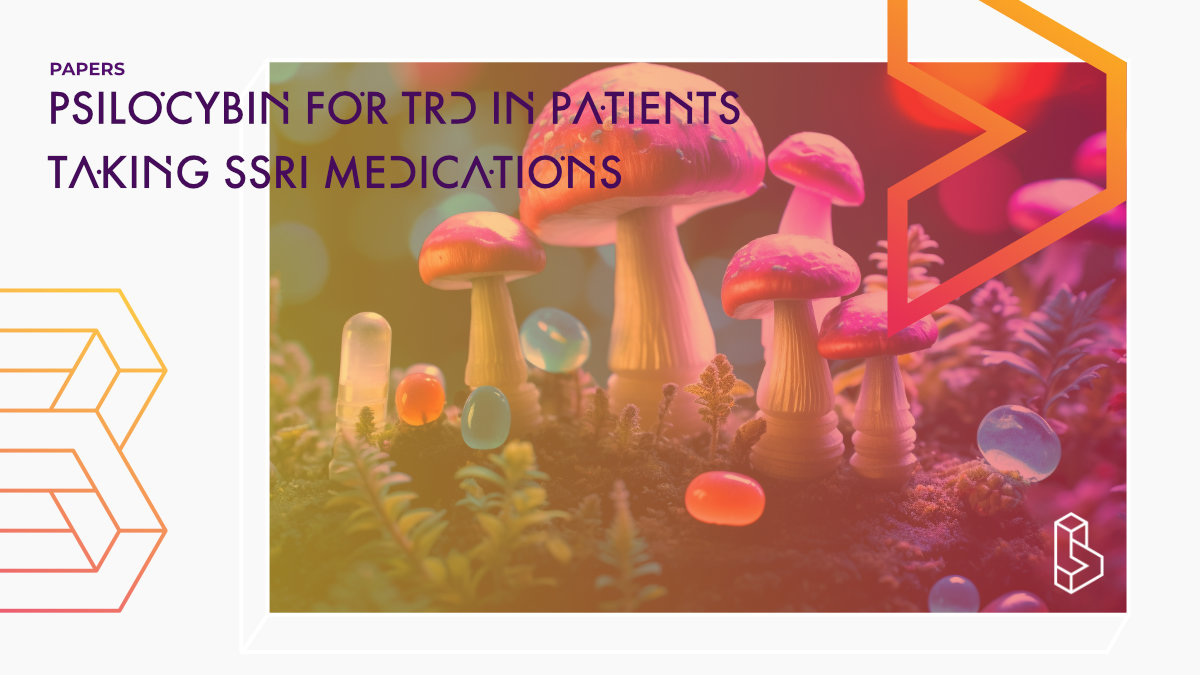This open-label Phase II trial (n=19) investigates the safety, tolerability, and efficacy of synthetic psilocybin (COMP360) as an adjunct to selective serotonin reuptake inhibitors (SSRIs) in adults with treatment-resistant depression (TRD). The study found no serious treatment-emergent adverse events or increased suicidal ideation. It reported a significant decrease in depression (MADRS) and Clinical Global Impression–Severity (CGI-S) scores at week 3, with response and remission observed in 42.1% of participants.
Abstract of Psilocybin for TRD in patients taking SSRI medications
“Psilocybin is being investigated as a treatment in adults with treatment-resistant depression (TRD). Withdrawal from serotonergic antidepressant drugs is a common prerequisite for taking part in trials of psilocybin due to the possibility of ongoing antidepressant drugs altering the psychedelic effect. This phase II, exploratory, international, fixed-dose, open-label study explored the safety, tolerability, and efficacy of a synthetic form of psilocybin (investigational drug COMP360) adjunct to a selective serotonin reuptake inhibitor in participants with TRD. Participants received a single 25 mg dose of psilocybin alongside psychological support and were followed-up for 3 weeks. The primary efficacy end point was change in the Montgomery-Åsberg Depression Rating Scale (MADRS) total score from Baseline at Week 3. Secondary end points were safety, including treatment-emergent adverse events (TEAEs), the proportion of responders and remitters at Week 3, and the change from Baseline to Week 3 in Clinical Global Impression–Severity (CGI-S) score. Nineteen participants were dosed and the mean Baseline MADRS total score was 31.7 (SD = 5.77). Twelve (63.2%) participants had a TEAE, most of which were mild and resolved on the day of onset. There were no serious TEAEs or indication of increased suicidal ideation or behavior. At Week 3, mean change from Baseline in MADRS total score was −14.9 (95% CI, −20.7 to −9.2), and −1.3 (SD = 1.29) in the CGI-S. Both response and remission were evident in 8 (42.1%) participants. Larger, comparator-controlled trials are necessary to understand if this paradigm can optimize treatment-outcome where antidepressant drug withdrawal would be problematic.”
Authors: Guy M. Goodwin, Megan Croal, David Feifel, John R. Kelly, Lindsey Marwood, Sunil Mistry, Veronica O’Keane, Stephanie Knatz Peck, Hollie Simmons, Claudia Sisa, Susan C. Stansfield, Joyce Tsai, Sam Williams & Ekaterina Malievskaia
Summary of Psilocybin for TRD in patients taking SSRI medications
Psilocybin has been shown to have antidepressant properties in pre-clinical models and small trials of participants with cancer-related depression, major depressive disorder, and treatment-resistant depression. The acute psychedelic experience may play an important role in the therapeutic efficacy of psilocybin. Psilocybin may be attenuated by SSRIs either via down-regulation of 5-HT receptors or a direct interaction with the serotonin transporter.
A recent study found that administration of an SSRI for two weeks did not significantly alter the acute subjective effects of 25 mg of psilocybin, suggesting that discontinuing stable antidepressant drug treatment prior to initiating psilocybin therapy may unnecessarily add complexity to study procedures.
Find this paper
Psilocybin for treatment resistant depression in patients taking a concomitant SSRI medication
https://doi.org/10.1038/s41386-023-01648-7
Open Access | Google Scholar | Backup | 🕊
Cite this paper (APA)
Goodwin, G.M., Croal, M., Feifel, D. et al. Psilocybin for treatment resistant depression in patients taking a concomitant SSRI medication. Neuropsychopharmacology (2023). https://doi.org/10.1038/s41386-023-01648-7
Study details
Compounds studied
Psilocybin
Topics studied
Treatment-Resistant Depression
Depression
Study characteristics
Original
Open-Label
Participants
19
Humans
Authors
Authors associated with this publication with profiles on Blossom
Guy GoodwinDr Guy Goodwin is the Chief Medical Officer at COMPASS Pathways and an Emeritus Professor of Psychiatry at the University of Oxford, UK. His research focusses on the neurobiology and treatment of mood disorders, such as bipolar depression, with a focus on the commercial development of COMP360 psilocybin.
Institutes
Institutes associated with this publication
COMPASS PathwaysCOMPASS Pathways is a publicly listed company (NASDAQ) that is developing psilocybin for treatment-resistant depression (TRD) for which it has completed a successful Phase IIb trial. COMPASS is one of the largest psychedelic companies and has received substantial investment from atai.
Compound Details
The psychedelics given at which dose and how many times
Psilocybin 25 mg | 1xLinked Clinical Trial
The Safety and Efficacy Of Psilocybin as an Adjunctive Therapy in Participants With Treatment Resistant DepressionThis open-label, interventional trial (n=19) explored the effectiveness of 25mg of psilocybin as adjunctive therapy to SSRI use in participants with treatment-resistant depression (TRD).

